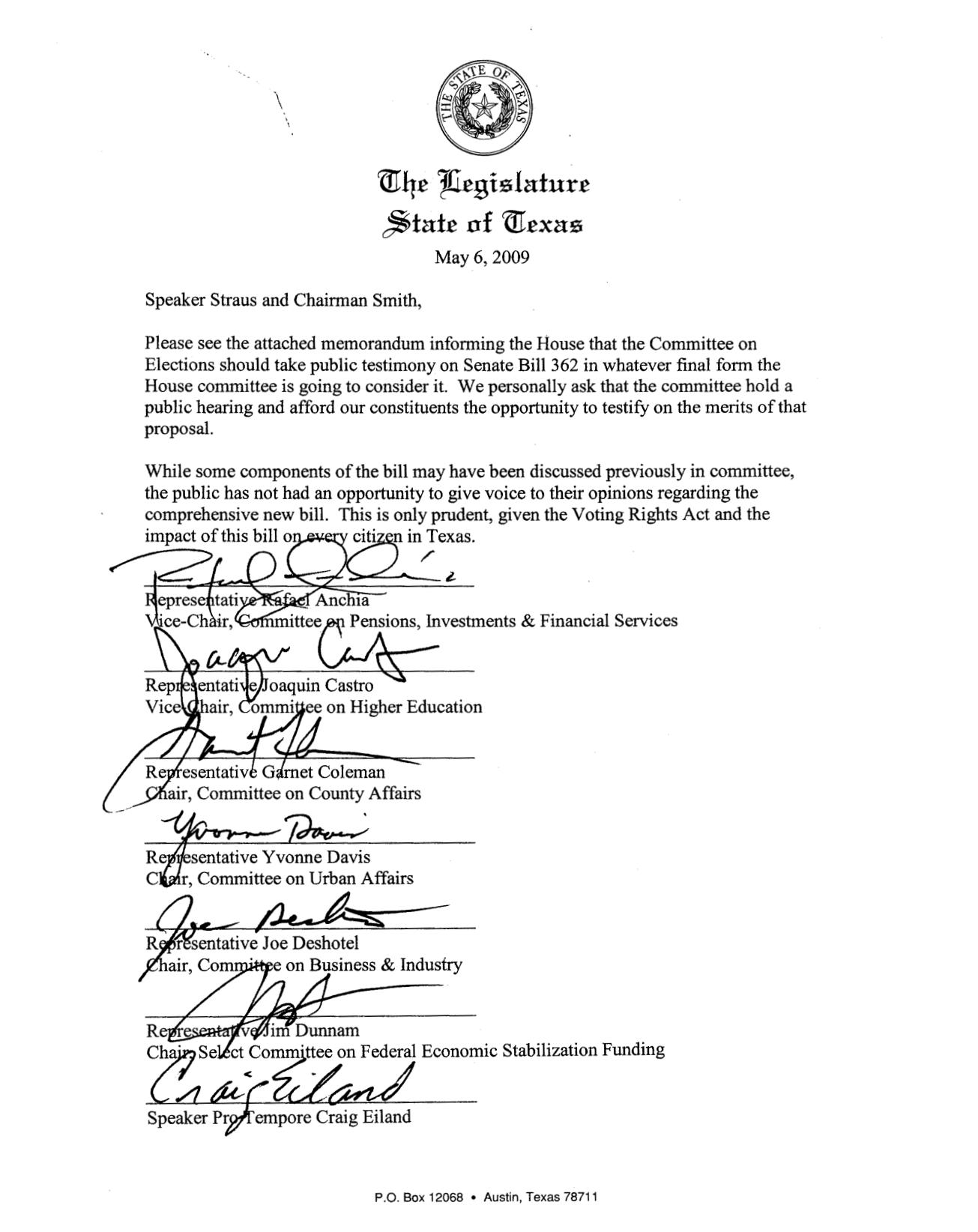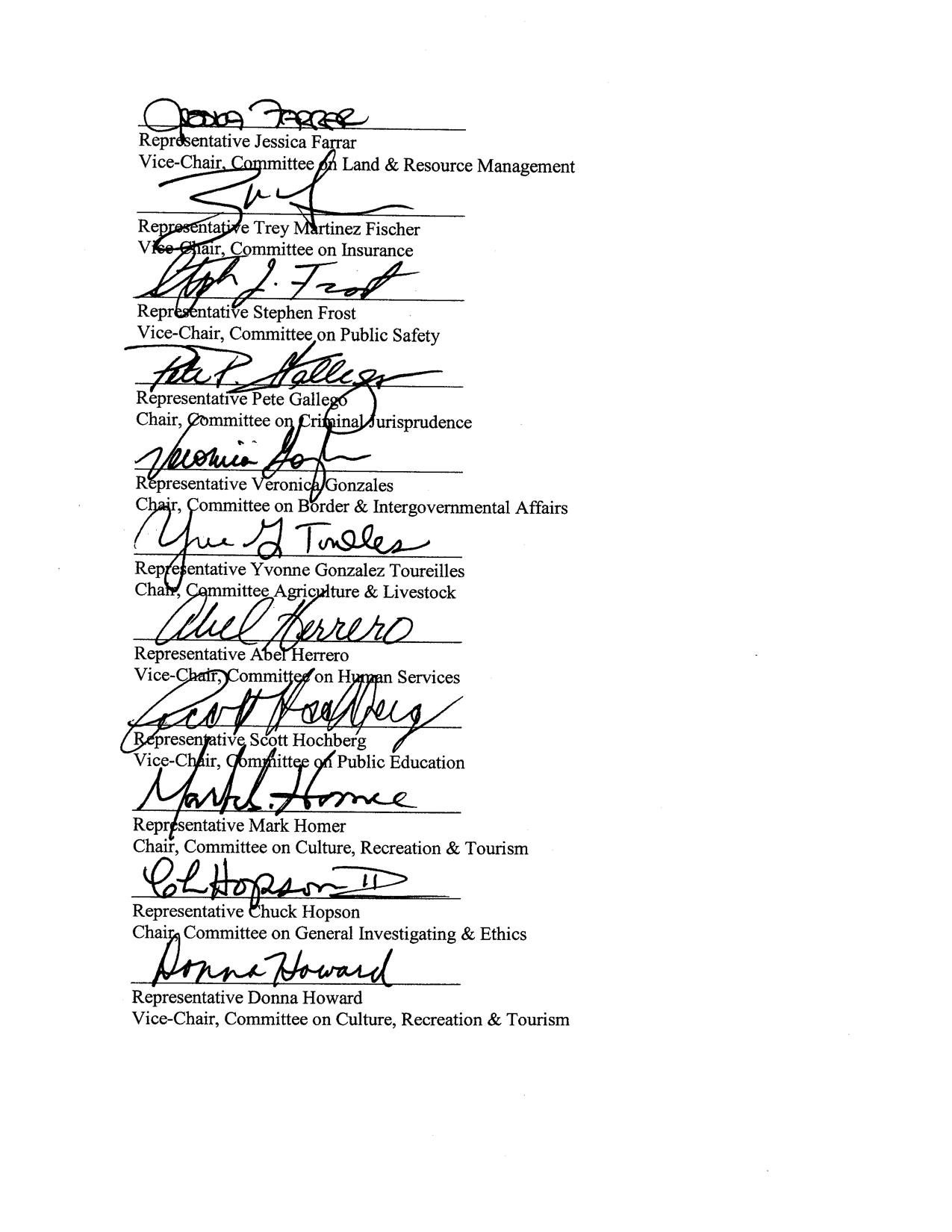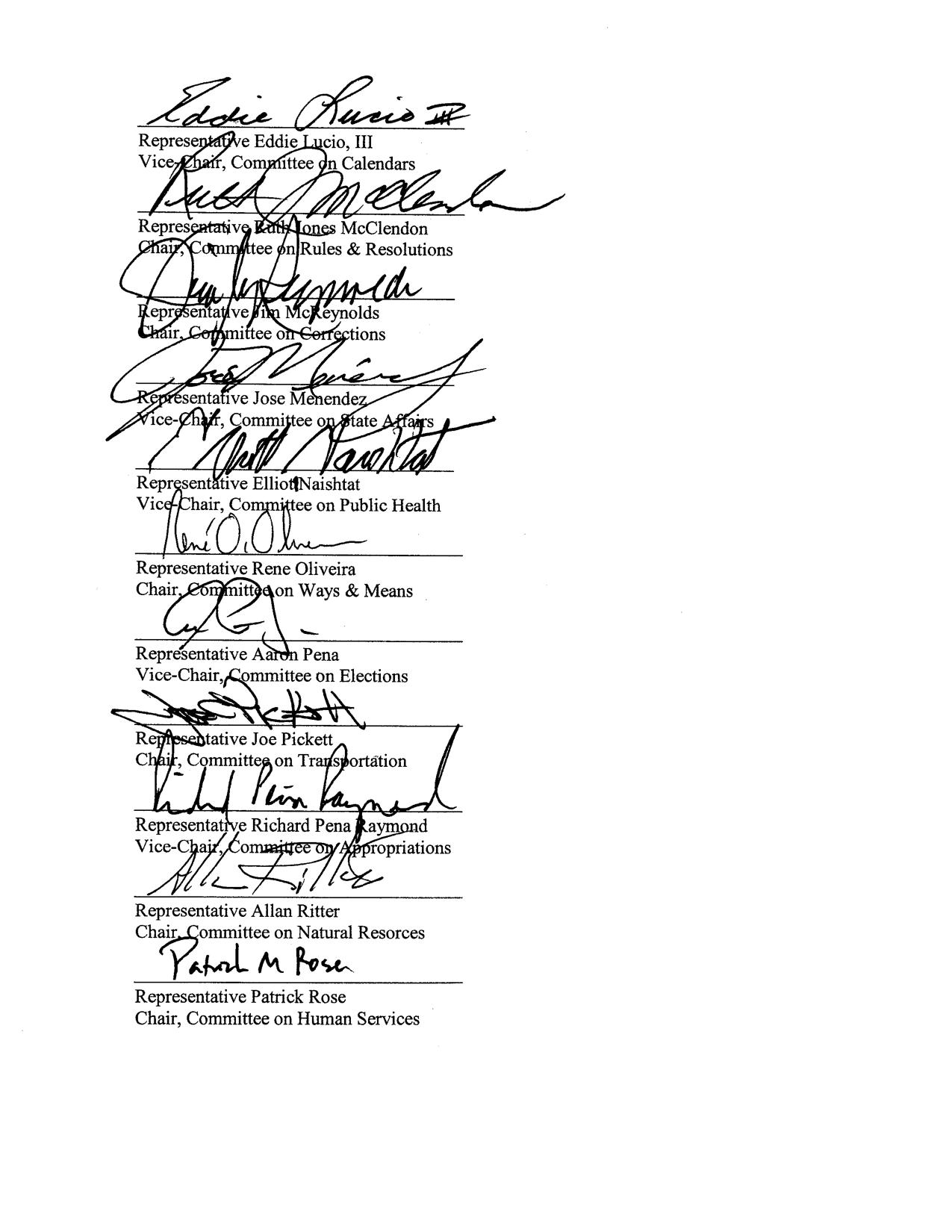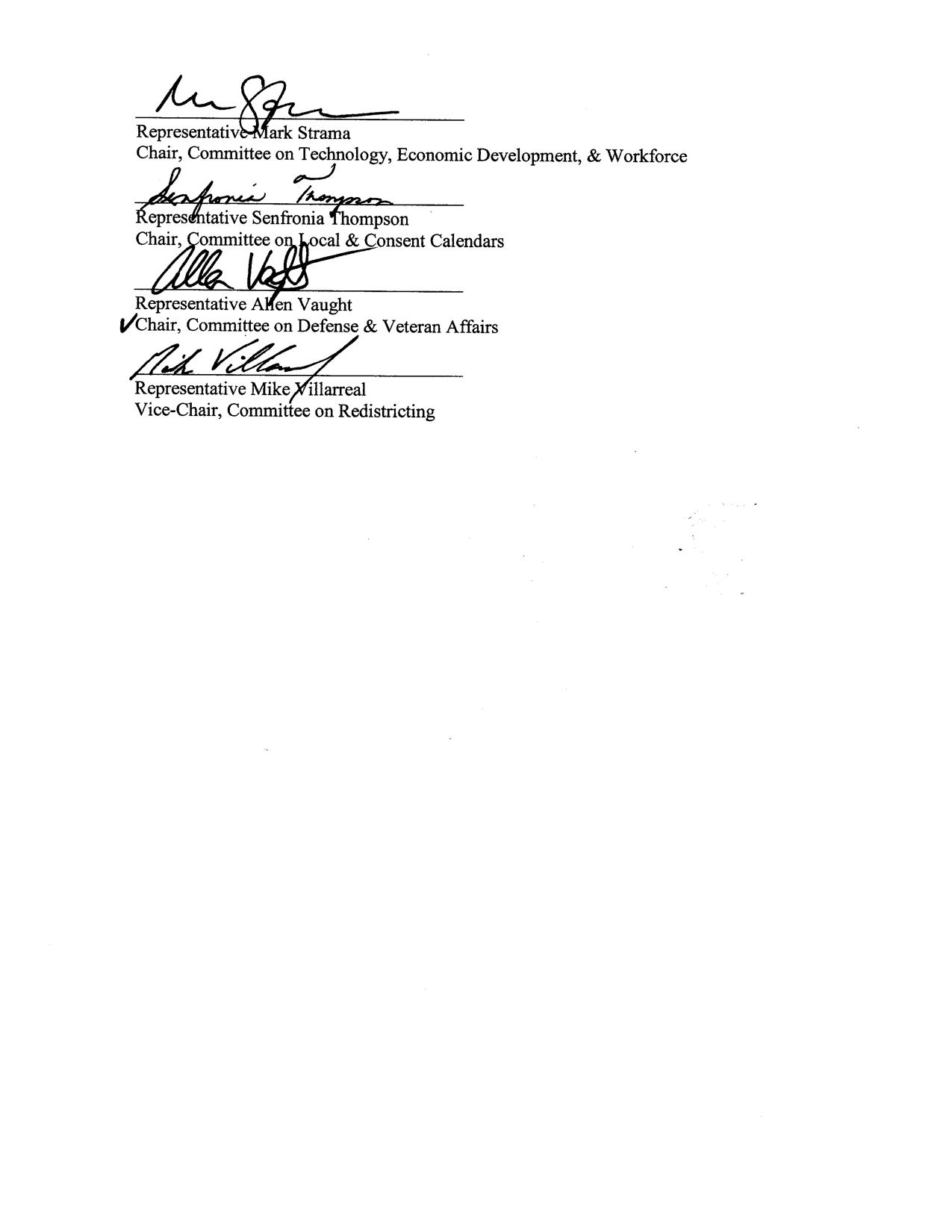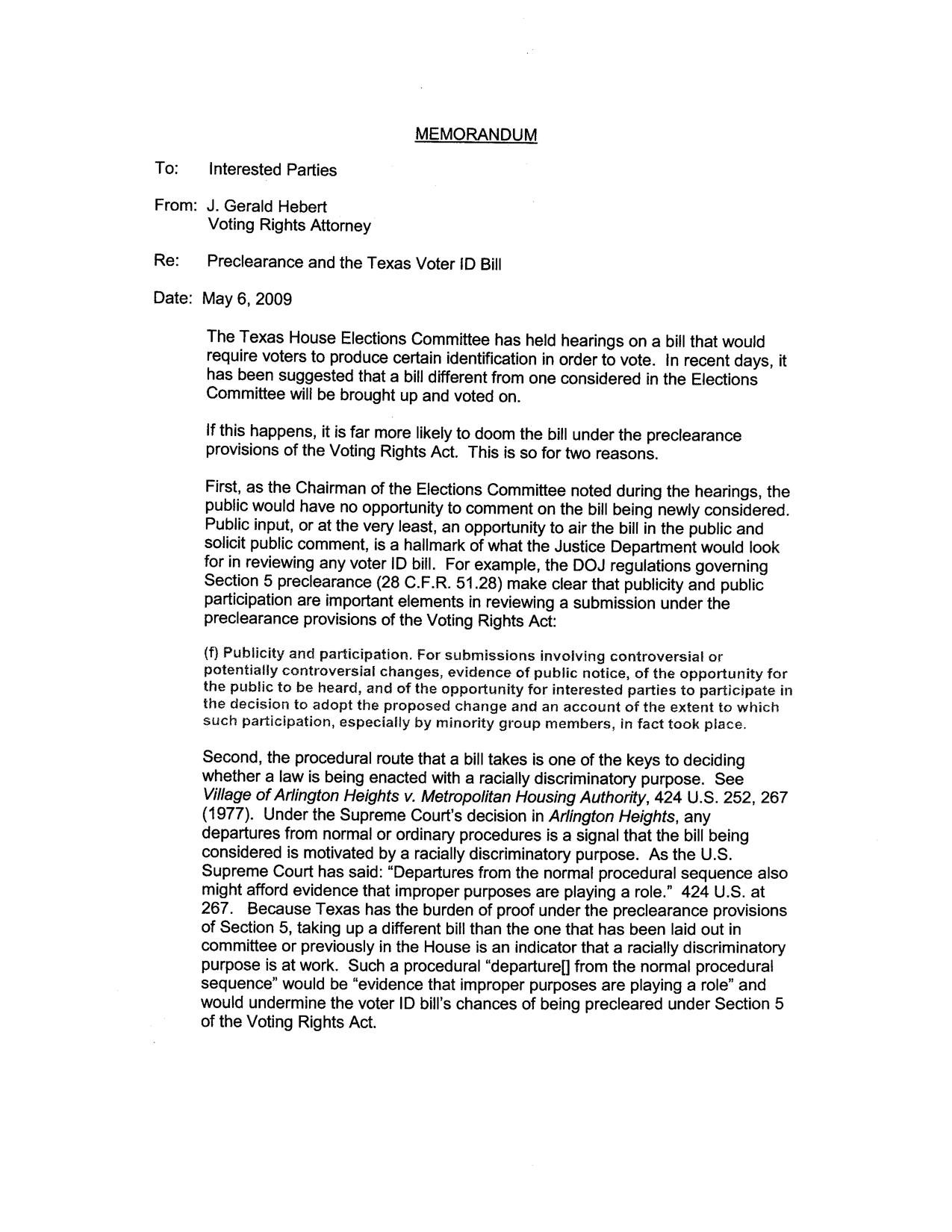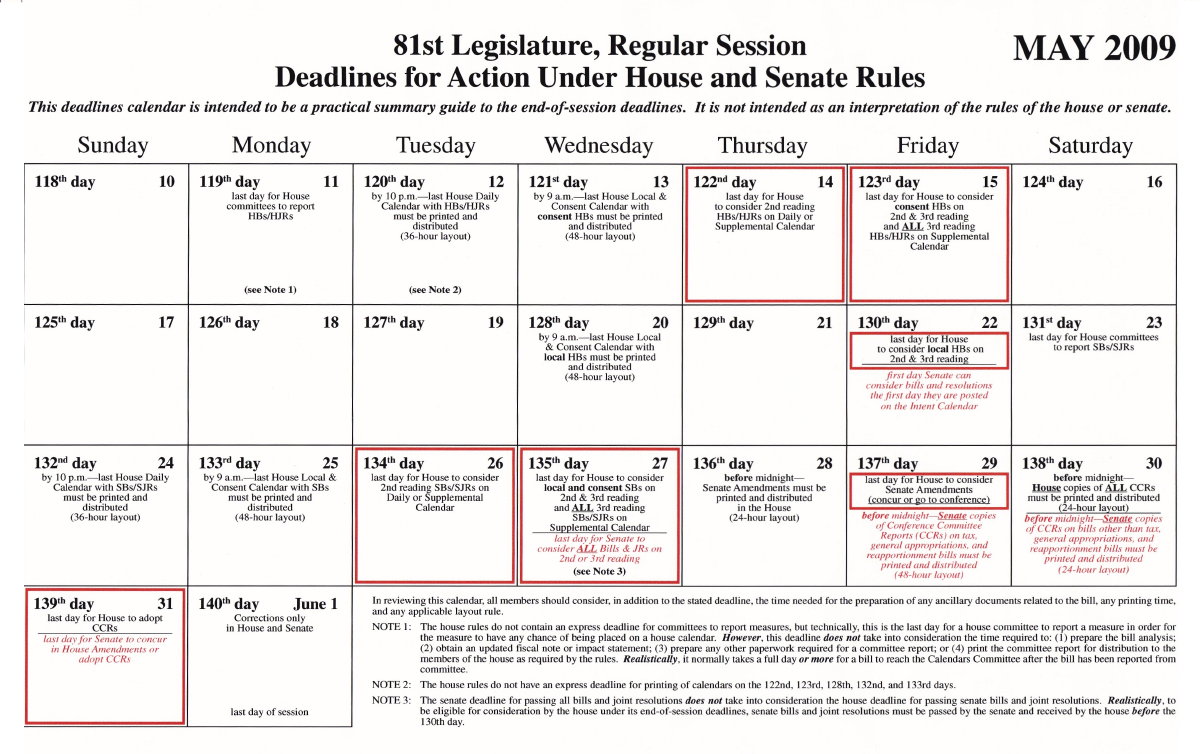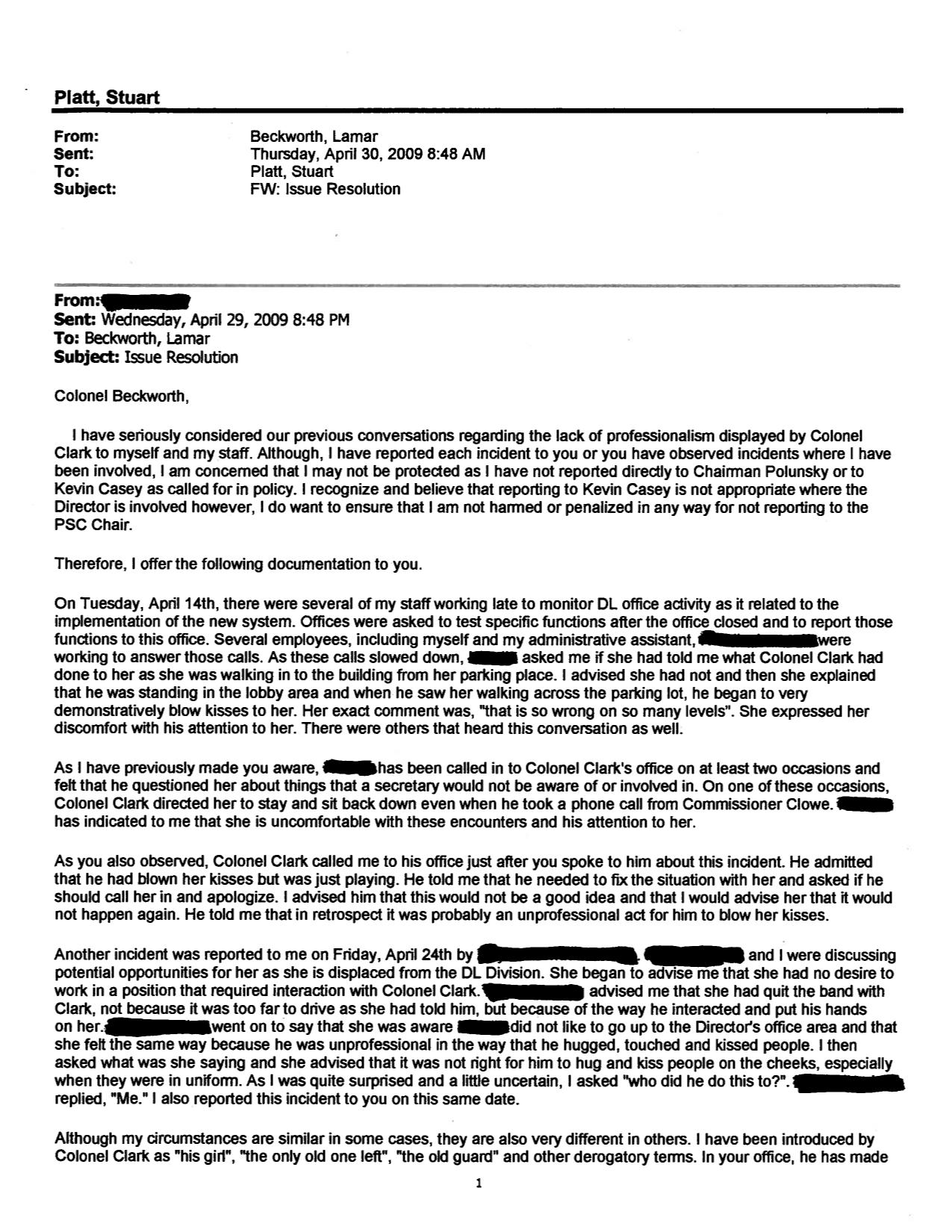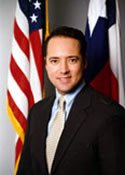If you're not under pressure, the House is sort of an interesting Petri dish right now.
Every major bill seems to split the pols in a different way and that might explain why they seem so laid back in the face of so many approaching deadlines: Their coalitions change on every major bill, and some of the normal animosities are set aside for the bargaining that's going on with each new issue.
Voter ID is a classic fight, breaking along party lines.
Transportation bills coming up next week have more to do with who's getting projects and who's not, who's mad and whether they're mad about traffic or tolls or Trans Texas Corridors, political anger and worries over taxes. It's a real dog's breakfast, mixing the disparate interests of cities and suburbs and rural areas.
Bailing out the coastal insurance pool — officially, the Texas Windstorm Insurance Association — depends on how far you are from the coast and how much rates might rise.
It changes with every issue.
If you are under pressure — that is, you are trying to get something done or undone — this is a difficult group to read. When the coalitions are fixed along party lines or behind a particular leader, strategy is easier. Talk to the honchos on the side that's in charge, cut your deal, light your cigar. But this House, with its shifting majorities and a relatively small sample of votes to guide strategists, is different. Interesting, even — if you're not under pressure.
Familiar Patterns
The pace has normalized a bit, with the House accelerating in the last week and a number of major bills starting to come to the floor.
They're touting statistics that show that the number of bills they've passed isn't all that different from previous years, in spite of all the talk of the slow pace. They're not comparing the number of minor and major bills, but that's another argument. And the major bills are here.
On the eastern end of the Pink Building, the Senate has done it again, sending a disproportionate number of major bills to the other body. Early in the session, the upper chamber likes to boast of its steadier, faster pace. More bills go from the Senate to the House than in the other direction. And about this time every two years, you start to hear worried senators talk about the hostages they've sent to the suddenly overworked House. That doesn't necessarily give the House the upper hand, but it's good for some bargaining power.
The end-of-session deadlines, as we've pointed out, start to fall in about 10 days. And there's one month left before the players leave the field.
Road House
Texas transportation reform is currently parked in the House, but members could be ready to move on Texas Department of Transportation sunset and local transportation options funding as soon as next week.
Sticking points during the debate could be malice toward TxDOT (and to the governor, and the Trans Texas Corridor, and toll roads) and aversion to taxes.
On Tuesday, the House Transportation committee voted out HB 300 by House Sunset Chairman Carl Isett, R-Lubbock, who says he's trying to keep the subject on the agency and how it works and not on policy, which he says ought to be addressed in other legislation. Transportation Chairman Joe Pickett, R-El Paso, D-El Paso, gives the sunset bill high marks, saying it focuses on empowering metropolitan planning organizations (MPOs) and includes detailed guidance on how the agency should operate over the next decade.
But he expects the bill to generate a lot of heat on the House floor. "It's going to be very contentious. A lot of amendments will be brought up to the bill, because there is a lot of ill will and distrust toward the agency," Pickett says. Amendments could include toll road limitations and changes to the Texas Transportation Commission, TxDOT's governing board, he says.
Senate Sunset chair Glenn Hegar, R-Katy, hopes to have his version, SB 1019, ready by next week, too, but has it on hold. "I'm trying to wait on the House bill. However, if the House bill doesn't move in kind of a quick fashion, then I would like to bring the Senate bill up and send it over here in another week or so, at least as a backup," he says.
Hegar wants to increase transparency of TxDOT with regard to current and future projects, require detailed short- and long-term plans, and ensure that TxDOT takes its cues from local entities instead of dictating from the state level. The bill would shorten the terms of transportation commissioners from four to two years, forcing them to appear before legislators each session. It also provides for a legislative oversight committee "to go out and do a real audit to determine if any more reconstruction of TxDOT is necessary," Hegar says.
The bill changes the makeup of TxDOT administration to ensure that a "CFO type" is on equal footing with a "CEO type" but does not touch the makeup of the TTC governing board.
"That's off the table. We don't have to address that whatsoever," he says.
The House version, similarly, would have TxDOT's administration led by CEO and CFO consuls, says Pickett. He adds that if local MPOs have actual control over projects, then it doesn't matter whether the agency is run by elected commissioners or an appointed czar.
Allowing Texans to raise transportation funds locally will hit the House fan at about the same time. The basic idea is to allow local voters to raise local motor fuels taxes, vehicle registration fees, etc., to pay for local projects.
"The philosophy behind it is the Legislature has been unwilling for over a decade now to adequately fund transportation, and so is the federal government," says former House Transportation chair Mike Krusee, R-Round Rock. "There are no signs they are about to step up to the plate to fund it. So local regions simply want the ability to help themselves."
There is, however, a However, according to Krusee: "Legislators are afraid to vote for anything that could be perceived to be a tax increase, even if it is a local option one that's voted on."
Krusee says he was never able to get his major funding bills over that hurdle, but he thinks Sen. John Carona, the Dallas Republican who's carrying the ball now "is making as good an effort as I've seen."
The Senate passed Carona's SB 855, and its corresponding constitutional amendment, SJR 52 by Sen. Wendy Davis, D-Fort Worth. Both of those are sitting in Pickett's committee, which has already held hearings on House versions by Rep. Vicki Truitt, R-Keller. Pickett's committee could vote those out before the weekend is over, he says.
If the votes break along party lines, the constitutional amendment will have trouble in the evenly divided House. Hegar, who spent the 2003 and 2005 sessions as a representative, was one of nine Senators to vote against both the Senate bills. He says he doesn't have much insight on what his former colleagues will do.
Even if they become law, local funding options aren't a panacea for Texas' transportation ills, Krusee cautions. "First of all, the elected officials have to put it on the ballot. Then the locals have to vote for it. And lastly, it still won't be enough money to do everything that's necessary," he says.
Straight, No Chaser
The Voter ID draft floating around the House will change before the House sees an official version, according to the author.
Rep. Todd Smith, R-Euless, isn't saying — to us, anyhow — what the changes will be. At last word, he was hoping to try to vote the bill out of his Elections Committee and on to the full House as early as next week.
The first trick is to get six votes on his committee; the second, to get a majority from on the floor. All but five of the House's 76 Republicans have signed a letter spelling out what they want and don't want in a Voter ID bill. The rub at the moment is that some of what's in the current version is also on that letter's list of taboos.
Quoting from their statement:
"Our principles concerning what the bill must contain are clear, this bill must:
• Ensure a valid photo identification is needed to vote
• Take effect at the next possible uniform election date
• Be free of any registration requirements such as same day voter registration that dilutes the intent of the bill, which is ensuring fair and accurate elections.
• Increase criminal penalties for voter fraud and registration
We are all strongly encouraging Chairman Todd Smith and the other Representatives on the Elections Committee to present a bill which protects the integrity of the electoral process, is fully implemented at the next possible uniform election date and ensures a reasonable period of advanced registration to allow voter registrars the time to protect the integrity of the registration process as well."
The GOP put out a list that includes the signatures of everyone but Speaker Joe Straus, Reps. Dennis Bonnen of Angleton, Delwin Jones of Lubbock, Tommy Merritt of Longview, and Smith. They didn't ask Straus, they said, in deference to his position. They included a statement from Bonnen, who said he's on the Elections Committee and is trying to get a bill out instead of killing it there, and that he's really for Voter ID and filed a bill showing his stripes earlier in the session. That leaves Smith, who's trying to do the same thing and to whom the GOP message is addressed, and Merritt and Jones, who both voted against Voter ID legislation when it came up two years ago.
Specifically, Smith's draft version wouldn't take effect until 2013 — after the next two election cycles. The Republicans want immediate changes.
Smith's version includes training for election officials and for voters, and creates criminal penalties for preventing a legal voter from voting in an election. The Secretary of State would have to report to the Legislature annually on any voting violations that year.
And the draft would require photo IDs, but would let voters who don't have those IDs to instead use two documents from an approved list that includes voter registration cards, recent utility bills, recent bank statements, official mail from government entities, birth certificates, marriage licenses and divorce decrees, citizenship papers, adoption, name and sex change papers, Social Security cards and similar government IDs, temporary licenses, library cards, and hunting or fishing licenses. Or they could vote provisionally using their signature, and a panel would later determine if those signature votes match signatures on the lists of registered voters.
The Republicans, in their letter, indicate they want no alternatives to photographic identification.
MUD in Your Eye
The federal Voting Rights Act was challenged in the U.S. Supreme Court, where justices heard arguments in a case that started in Austin this week, and their ruling later this year could affect everything from Voter ID to redistricting.
The transcript of the oral arguments is available online. And our original story on the North Austin Municipal Utility District Number One case is available here.
At issue is whether that MUD should have had federal approval before it moved a polling place or should have been allowed to "bail out" — that's a term of art. VRA requires Texas and other states with histories of racial discrimination to get federal approval of changes made to voting procedures.
Depending on what the court rules, and when, that could come into play on Voter ID this year and on redistricting in 2011. Under current law (and the court's historical reading of it), changes to the voting laws and to the political maps in Texas require approval from the U.S. Department of Justice. If the court declares that provision unconstitutional, what's decided in Texas might stand without that federal sign-off.
Things in Motion
The state's budgeteers — the five representatives and five senators (and "alternates" who are sitting in without voting power) will start meeting formally next week to reconcile the House and Senate versions of the budget (they met this week, said howdy, asked the staff to bone up, and left). The Legislative Budget Board has a summary of the differences online; if you want to go into ghastly detail, you've got about 1,808 pages of reading ahead. The bills differ by $4.8 billion.
The Senate spent more on Medicaid growth, community-based services and waivers, incentive pay for teachers, higher education incentive funds, community colleges, prison guards, inmate healthcare, the governor's office, and debt service on bonds.
The House has more money in community mental health, eligibility services at the Health and Human Services Commission, science lab grants, Texas Grants, higher education formula funds (and health related formula funds), residential services at the Texas Youth Commission, grants for colonias and rural water projects, $15 million to end bad debts at the Texas Agricultural Finance Authority, oil storage tank cleanup, and bonuses for retired and current state employees and retired teachers.
And the LBB write-up includes a list of things that could affect the numbers, including changes to the business tax, school finance, Pre-K legislation, CHIP, Tier 1 universities, healthcare, and state schools.
The budgeteers from the lower chamber are Republicans Jim Pitts of Waxahachie, John Otto of Dayton, John Zerwas of Houston; and Democrats Ruth Jones McClendon of San Antonio, and Richard Raymond of Laredo. The Senators in that parley were named last week: Republicans Steve Ogden of Bryan, Florence Shapiro of Plano, and Tommy Williams of The Woodlands, and Democrats Juan "Chuy" Hinojosa of McAllen and Royce West of Dallas.
Waco Democrat Jim Dunnam got the House to require its conferees to meet with the Senate only in public, posted meetings.
• The Senate and the House both approved bills that attempt to change accountability in public schools while taking some of the pressure off of TAKS tests. They'll have to hammer out a number of differences. A weird example: The House included an amendment that allows students with good marks to ignore rules governing how long they can wear their hair. Honest. The general idea is to replace the current battery of standardized tests with end-of-course exams that are supposed to make sure students are ready for post-secondary education. Rep. Rob Eissler, R-The Woodlands — the House sponsor — says Texas currently ranks 38th in that measurement.
• The Unemployment Insurance bill passed earlier by the Senate — in defiance of Gov. Rick Perry's wishes — is on its way to the full House (or, at least, has made it to the Calendars Committee, which can also be a final destination for legislation). The Business & Industry Committee — which has a Republican majority — voted it out. By the way, the Alaska legislature pushed Gov. Sarah Palin to go along. She, like Perry, didn't want to take the money. But Alaska will take the money.
• A House committee approved an expanded Pre-Kindergarten program that has more than 100 sponsors but also sports a $300 million fiscal note. That's on the way to Calendars.
• Legislation needed to create new flagship universities in the state is out of the Senate on the way to the House. It doesn't pick favorites, but sets out the standards and lets the schools run the race. The University of Texas and Texas A&M University are already top-tier public universities (Rice University is a private Tier 1). Others — Texas Tech, University of Houston, University of Dallas, etc., etc. — want to be. That'll meet a companion bill somewhere in the middle of the Capitol Rotunda; the House passed a similar bill a few days earlier.
• The Senate sent a windstorm bill to the House, where lawmakers are still talking about whether and how to spread the costs of hurricanes and such across the state. The Senate version — sponsored by Troy Fraser, R-Horseshoe Bay — includes a $400 million "post-event" assessment against property and casualty insurers that do business in Texas. The reserves in the Texas Windstorm Insurance Association, or TWIA, are depleted right now; if a storm hits and claims are made against the fund, it would be able to tax the state's insurance companies to pull in that $400 million. TWIA would also be able to issue up to $600 million in bonds to build its reserves, with the debt service to be paid by insurers in the state.
• Doctors would have to offer ultrasounds to women seeking abortions, but the women could opt out under the terms of legislation tentatively approved by the Senate. That version of SB 182 watered down some from what Sen. Dan Patrick, R-Houston, wanted. The patients would have to fill out and sign a form saying whether they wanted to receive, see, hear, and/or get an explanation of the ultrasound before the abortion, and then would have to sign a consent form for the operation itself.
• It turns out the state allows you to take a kid on your motorcycle no matter how old the kid is. So there's proposed legislation — from Rep. Valinda Bolton, D-Austin — that would require any passenger under five years of age has to ride in a sidecar. Five and up? Hold on for dear life, just like grownups.
• The lobby filings at the Texas Ethics Commission are easier to search online now; the commission's new search engine lets you go back to the beginning of 2004. You can find out, for instance, that lobbyists spent $2,586,380 in the Food & Beverage category in 2007, when the Legislature held its last regular session (numbers for this one aren't yet reported). Entertainment is a separate category, totaling $459,101 that year. The lobsters spent another $260,167 on gifts. You can even ask for detailed lists, finding out who gave away circus tickets, and shaving kits, and pocket knives.
• Department of Corrections: In some editions last week, we wrote that Rep. John Otto's property tax reforms would allow local tax appraisers a larger margin of error in their estimates than they're allowed now. That ain't right; if they vary more than five percent from what the state says values should be, they have to change their numbers. To do otherwise, Otto says, would put a big price tag on his legislation. Sorry, sorry, sorry.
The Lower 40
Quick take on Arlen Specter's switch to the Democratic Party:
He'd be the 59th Democrat in the U.S. Senate. If Al Franken ever beats Norm Coleman in Minnesota (the recount from the November election remains unsettled, with Franken in the lead and the courts, at this point, on his side), he'd been the 60th Democrat. That's the magic number in the U.S. Senate: 60 senators are what it takes to squelch the filibusters that give a minority its clout.
So? Until all that falls into place, the Republicans have been clutching every vote they've got, including that of Texan Kay Bailey Hutchison. She wants to run for governor and talked about resigning late last year. But the numbers made a case against risking the Texas seat to a Democrat. She stayed. But she could still resign later this year — there's talk of that inside and outside her camp — to focus on the state race. If Franken prevails after the Spector switch, hers would be an insurance vote instead of a critical one, and she'd be free to quit to pursue the next paragraph on her resume. It could all have a short life: Hutchison and Spector will be on their states' ballots at the same time (whether she quits the Senate or not) and the numbers could easily change in the November 2010 election.
The Race That Might Be
It took more than ten days for the feds to put it online, but the campaign finance reports for all of the U.S. Senate wannabes from Texas are now available in all their gory detail.
The headliner is John Sharp, the Democrat who announced his fundraising prowess a couple of weeks ago without mentioning that 80 percent of his campaign money came from his personal bank account. Sharp's loans to his campaign total $2,001,678, according to his report with the Federal Election Commission. And he spent some more of his own money — $23,000 — directly on consultants and services, his report says.
It all spends the same, however, and Sharp ended the first quarter of the year with more cash on hand than anyone else on the list. Including only the folks who have expressed interest in Kay Bailey Hutchison's Senate seat, the cash list is: Sharp, $2,432,675; Houston Mayor Bill White, Democrat, $2,131,638; former Secretary of State Roger Williams, Republican, $388,628; Sen. Florence Shapiro, Republican, $310,407; Railroad Commissioner Elizabeth Ames Jones, Republican, $164,662; and Railroad Commissioner Michael Williams, $113,957.
Roger Williams got more than half his money — $200,501 — from himself, but he's second to Sharp in the loan column. White smoked everyone else in contributions, gathering $1,876,163 during the first three months of the year. Sharp, at around $500,000, was second. White also spent the most, at $472,119; nobody else spent more than $100,000.
By the way, the delay of the reports — Sharp's in particular — apparently took place in the U.S. Senate. He mailed his report on April 15, the due date. The Secretary of the Senate didn't send the report on to the FEC until April 21. That agency posted it over the weekend.
Next Year's Ballot
Democrat Barbara Ann Radnofsky, a Houston attorney who ran unsuccessfully against Kay Bailey Hutchison in the 2006 race for U.S. Senate, filed papers to run for attorney general next year. And she's got a couple of fundraisers coming up in Austin and Houston. She's the first Democrat to actually enter the thing. Former Travis County DA Ronnie Earle told the Austin American-Statesman that he might run, and a number of Republicans are looking, on the assumption that AG Greg Abbott won't seek a third term. His former solicitor general, Ted Cruz, is the only active candidate on that side at this point. And he says he won't run if Abbott does.
Political People and Their Moves
President Obama nominated former state Rep. Juan Garcia, D-Corpus Christi, to be assistant secretary of the Navy for manpower and reserve affairs. Garcia — who served one term in the Texas House before losing to Republican Todd Hunter in November — was one of Obama's law school classmates. He's been working at a Corpus law firm.
In last week's episode, U.S. Attorney Johnny Sutton announced he'd be leaving that job for a post unnamed. Now, it's named: He's joining a law firm with former U.S. Attorney General John Ashcroft. Sutton will head a new Austin office.
Bryan Preston signs on as the new spokesman for the Republican Party of Texas. He's the replacement for Hans Klingler, who left some time ago to work on Kay Bailey Hutchison's gubernatorial bid. Preston's latest gig was as a producer on Laura Ingraham's radio show.
Railroad Commissioner and U.S. Senate candidate Michael Williams says he's been endorsed by 22 Republican sheriffs, or one of every five Republican sheriffs in the state.
Quotes of the Week
Bill Ferguson, a board member of Northwest Austin Municipal Utility District Number One, on the MUD's challenge to the federal Voting Rights Act, quoted by the Associated Press: "I'm sort of embarrassed that we're still subject to this because it makes us look like dumb crackers. I don't think it's appropriate anymore."
Rep. Phil King, R-Weatherford, quoted by the Associated Press on Speaker Joe Straus' decision to let House members run more of their own business without his direction: "Chairs are taking a lot more Tylenol and Advil than in previous sessions."
San Francisco Chronicle Editor-at-large Phil Bronstein, talking about newspapers in The New York Times: "For people who still love print, who like to hold it, feel it, rustle it, tear stuff out, do their I. F. Stone thing, it's important to remember that people are living longer. That's the most hopeful thing you can say about print journalism, that old people are living longer."
Sen. John Carona, R-Dallas, on passing a major transportation bill without much hoopla: "It's all part of my humble nature."
Vice President Joe Biden, during a visit to Austin, quoted in the White House Pool Report: "You Texas guys are ugly as hell, but your women are beautiful. In southern Delaware, they would say y'all married up."
Texas Weekly: Volume 26, Issue 17, 4 May 2009. Ross Ramsey, Editor. Copyright 2009 by Printing Production Systems, Inc. All Rights Reserved. Reproduction in whole or in part without written permission from the publisher is prohibited. One-year online subscription: $250. For information about your subscription, call (512) 302-5703 or email biz@texasweekly.com. For news, email ramsey@texasweekly.com, or call (512) 288-6598.


